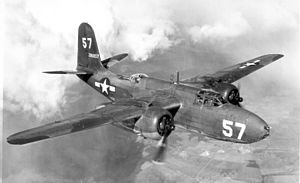
Summary
No. 1460 (Fighter) Flight was formed at RAF Acklington on 15 December 1941, equipped with Turbinlite Douglas Boston and Douglas Havoc aircraft.[2] The flight became operational in May 1942 and made its first and only contact with the enemy in June of that year.[3] On operations they cooperated first with the Hawker Hurricanes of 43 Squadron and later with those of 1 Squadron.[4] The flight was replaced with 539 Squadron on 2 September 1942[4][5] but officially disbanded as late as 23 January 1943.[4]
| No. 1460 Flight RAF | |
|---|---|
 An A-20 Havoc of the USAAF, like the ones used by the flight | |
| Active | 15 Dec 1941 – 2 Sep 1942 |
| Country | |
| Branch | |
| Role | Night Fighter (Turbinlite) |
| Part of | No. 13 Group RAF, Fighter Command[1] |
| Insignia | |
| Squadron Badge heraldry | No known badge |
| Squadron Codes | No known identification code for the flight is known to have been carried |
539 Squadron, which had taken over the men and machines, carried on flying the Turbinlite Bostons and Havocs until the system was abandoned on 25 January 1943,[6] when Turbinlite squadrons were, due to lack of success on their part and the rapid development of AI radar, thought to be superfluous.[7]
Aircraft operated edit
| From | To | Aircraft | Version |
|---|---|---|---|
| 15 December 1941 | 2 September 1942 | Douglas Havoc | Mk.I |
| 15 December 1941 | 2 September 1942 | Douglas Havoc | Mk.I (Turbinlite) |
| 15 December 1941 | 2 September 1942 | Douglas Boston | Mk.I |
| 15 December 1941 | 2 September 1942 | Douglas Boston | Mk.II (Turbinlite) |
| 15 December 1941 | 2 September 1942 | Douglas Boston | Mk.III (Turbinlite) |
Flight bases edit
| From | To | Base |
|---|---|---|
| 15 December 1941 | 2 September 1942 | RAF Acklington, Northumberland |
Commanding officers edit
| From | To | Name |
|---|---|---|
| 15 December 1941 | March 1942 | S/Ldr. G.J. Denholm, DFC |
| March 1942 | 2 September 1942 | S/Ldr. J.S. Morton, DFC |
References edit
- Notes
- Bibliography
- Delve, Ken. The Source Book of the RAF. Shrewsbury, Shropshire, UK: Airlife Publishing, 1994. ISBN 1-85310-451-5.
- Halley, James J. The Squadrons of the Royal Air Force & Commonwealth 1918-1988. Tonbridge, Kent, UK: Air Britain (Historians) Ltd., 1988. ISBN 0-85130-164-9.
- Jefford, C.G. RAF Squadrons, a Comprehensive record of the Movement and Equipment of all RAF Squadrons and their Antecedents since 1912. Shrewsbury, Shropshire, UK: Airlife Publishing, 1988 (second edition 2001). ISBN 1-85310-053-6.
- Lake, Alan. Flying Units of the RAF. Shrewsbury, Shropshire, UK: Airlife Publishing, 1999. ISBN 1-84037-086-6.
- Rawlings, John D.R. Fighter Squadrons of the RAF and their Aircraft. London: Macdonald & Jane's (Publishers) Ltd., 1969 (2nd edition 1976, reprinted 1978). ISBN 0-354-01028-X.
- Sturtivant, Ray, ISO and John Hamlin. RAF Flying Training And Support Units since 1912. Tonbridge, Kent, UK: Air-Britain (Historians) Ltd., 2007. ISBN 0-85130-365-X.
External links edit
- Aircraft and Markings of no. 511-598 sqn, amongst them 539 sqn, the successor of 1460 flt.


